Reflections on Programming Independent U.S. Documentaries for a Cuban Film Festival
The XX Santiago Álvarez Documentary Film Festival in Santiago de Cuba from March 3 - 8, 2023 would be dedicated to the Independent Documentary of the United States (each year the festival is dedicated to the filmmakers of a specific country)! What? A Cuban film festival honoring the filmmakers from the very country that has tried to strangle the island nation with a devastating economic blockade for the last 64 years? What a great idea, I thought.
The festival, held each year in Santiago de Cuba, is named after legendary filmmaker Santiago Álvarez, one of the founders of the Cuban film institute, ICAIC, and known for his hundreds of nocticieros, or newsreels, that entertained and informed the Cuban people after the 1959 revolution. Álvarez’s work influenced a new generation of Cuban filmmakers, and many grassroots filmmakers in the U.S. in the 1960s and 1970s.
My film Detroit 48202: Conversations Along a Postal Route screened at the 2020 festival and won the Special Jury Award. When the festival organizers asked me (sort of told me) to organize a special showcase of U.S. documentaries, I was all in. I asked Lázara Herrera, President of the Festival, and widow of Santiago Álvarez, why they decided to dedicate the festival to U.S. filmmakers. She told me:
Yo no puedo hacer un festival dedicado a los estados unidos. ¿Dedicado a Hollywood? ¡No! Yo tengo que hacer un festival dedicado a los que parten el lomo para filmar, que defiendan las causas justas, que denuncian la injusticia, y ellos son los documentalistas independientes.
I can’t dedicate the festival to the United States. To Hollywood? No! I must dedicate the festival to those who break their backs to film, who defend just causes and denounce injustice, and those are the independent documentary makers in the United States.
Powerlands Director, Ivey-Camille Manybeads Tso with Festival Director, Lázara Herrera.
The collaborative process of putting together a section of an international film festival was interrupted and delayed for 2 1/2 years due to the Covid pandemic. But in the fall of 2022, Catherine Murphy, director of the films Maestra and Silvio Rodriguez: Mi Primera Tarea, and I began to plan. How would we choose a selection of 9 -10 films to represent the vast range of independent U.S. documentaries? We relied on conversations with friends in the documentary community, including dearly departed Michelle Materre, folks from Third World Newsreel, California Newsreel, and New Day Films to brainstorm an extensive list to choose from. We were looking for films that reflected the history and diversity of independent
documentary, films we’ve been inspired by, films that revealed the political and aesthetic concerns of the communities we exist in, and films we thought would interest a Cuban audience.
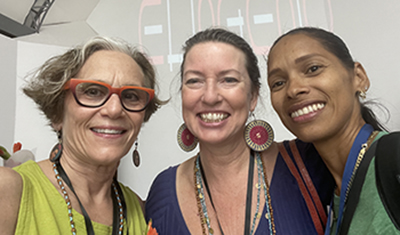
Pam Sporn and Catherine Murphy with Aimee La Rosa from the Centro Provincial de Cine de Santiago de Cuba.
In the end, Catherine and I invited 14 films to be part of the showcase: Union Maids, with a tribute to recently passed Julia Reichert, Tongues Untied, Missing In Brooks County, Making The Impossible Possible: The Story Of Puerto Rican Studies In Brooklyn College, I Didn’t See You There, Vision Portraits, We Still Here, Bakosó: Afrobeats Of Cuba, Decade Of Fire, From Mambo To Hip Hop, Powerlands, Black Panther: Aka Off The Pig, A Dream Is What You Wake Up From, Unapologetic, and a program of shorts by the Meerkat Collective. We felt our selections built on the legacy of progressive U.S. filmmakers bringing work to Cuba and having an exchange with Cuban filmmakers going back to the 1960s. All the filmmakers whose work we invited were excited to have their work shown in Cuba. We thought perhaps 4 – 5 would want to accompany their films to the festival. Who knew that we’d end up with a group of 31 filmmakers, producers, and protagonists! Our Cuban collaborators were amazed and honored.

Teresita Herrera, General Coordinator of the Festival, told me that the presence of the U.S. and Puerto Rican filmmakers at the festival provided an opportunity to exchange ideas and experiences in an atmosphere of mutual respect and comprehension. According to Teresita, our films left a deep impression on the audiences in Santiago, who found them highly informative and filled with a sense of understanding and friendship.
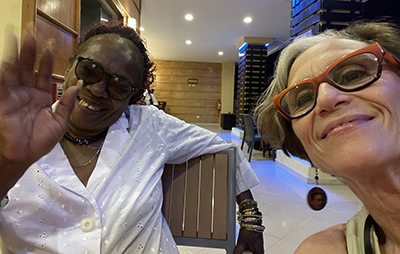
Teresa Herrera with the author.
A mutual sense of solidarity was expressed by the U.S. documentarians. Jim Klein gave a heartfelt introduction to the opening night screening of Union Maids, which he co-directed with Julia Reichert. He said:
It is a great honor to be at this festival and it’s a great honor to introduce this film that I made with Julia Reichert so many years ago.” Jim pointed out that Julia passed away in Dec of 2022 and is being honored at film festivals and events around the world. But, he continued, “It is very important to me that this is in Cuba. We were both very inspired by the Cuban Revolution and by the films of Santiago Álvarez, especially 79 Springtimes of Ho Chi Minh and Now. We saw them at the university, and they changed us. That sense of fighting larger forces and coming through and changing the world was what we wanted to do as well.
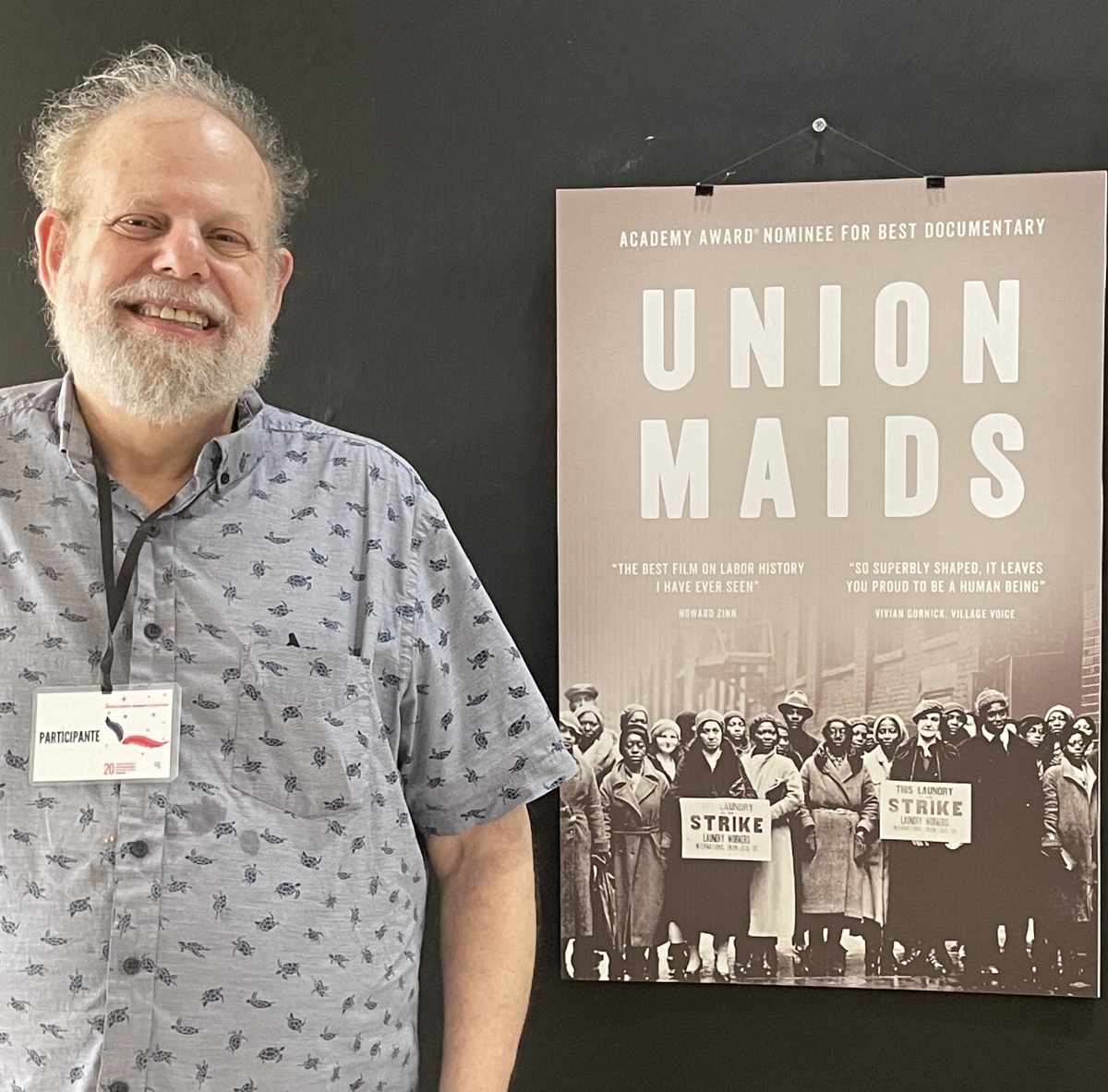
Jim Klein interviewed by Cuban TV after the opening night screening of Union Maids.

Catherine and I selected Union Maids to represent the legacy of working-class storytelling so important to many of us independent documentary makers. But how would a Cuban audience respond to an almost 50-year-old film featuring three North American women speaking about their years organizing radical union struggles? A friend from Cuban TV told me afterwards, “That film could have been made yesterday, it’s so good!”
¡Que bonita bandera, que bonita bandera… es la bandera puertorriqueña!
- sang the students at Santiago’s Universidad de Oriente as they left a screening of Making the Impossible Possible: The Story of Puerto Rican Studies in Brooklyn College. The members of APREE (Alliance for Puerto Rican Education and Empowerment) representing the film were visibly moved by this musical expression of solidarity with Puerto Rico. APREE member Lizette Colón had this to say about the screening and discussion that followed:
Me alegré muchísimo cuando pregunté a los estudiantes que allí se encontraban, con qué profesor habían venido a nuestro evento y me contestaron que con ninguno en particular, sino que habían venido por interés propio. Esa curiosidad innata y ganas de aprender fueron palpables a través de toda nuestra presentación del documental…La discusión entre los panelistas, los colegas de la Universidad del Oriente y los estudiantes fluyó desde la ilusión vs. la realidad cruda del inmigrante latinx en Estados Unidos; sobre los retos de Puerto Rico como colonia y de Cuba sometida a un embargo estrangulante; sobre cómo la isla nuestra, al igual que la de ellos, se está quedando sin jóvenes; sobre la importancia de mantener la esperanza, a la vez que reconocemos los grandes retos y obstáculos que crean la desesperanza a los que se enfrentan día a día, marcados por el eterno embargo sin sentido.
I was very happy when I asked the students who were there with which professor they had come to our event and they answered that with no one in particular, that they had come of their own interest. That innate curiosity and desire to learn were palpable throughout our presentation of the documentary…The discussion between the panelists, colleagues from the Universidad del Oriente and the students flowed from the illusion vs. the harsh reality of the Latinx immigrant in the United States; about the challenges of Puerto Rico as a colony and of Cuba subjected to a strangling embargo; about how our island, like theirs, is running out of young people; about the importance of maintaining hope, while recognizing the great challenges and obstacles that create hopelessness for those who face every day, marked by the eternal senseless embargo [against Cuba].

APREE members Luz Delgado, Antonio Nadal, Lillian Sánchez, Lizette Colón, and Chris Garcia during Q&A at Universidad de Oriente.
Perhaps it was not an accident that the design of the official festival poster included two wings, one white, one red – evoking a line from Puerto Rican poet Lola Rodríguez de Tió, “Cuba y Puerto Rico son de un pájaro las dos alas.” (Cuba and Puerto Rica are two wings of one bird.)

The mutual connection between the two islands was not only expressed through film at the festival, but also through music. Grammy Award-nominated Bobby Sanabria gave a master class/performance at the Esteban Salas Music Conservatory that brought a crowded room to their feet, with a powerful rendition of Juan Tizol’s composition Caravan.
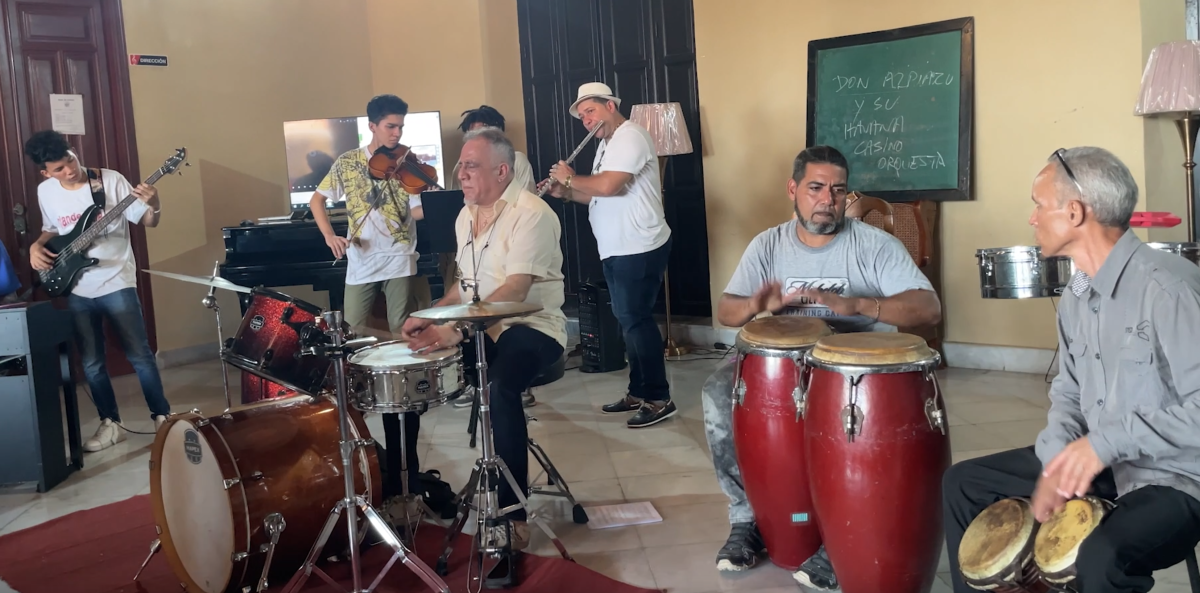
Bobby Sanabria jamming with students and faculty at Conservatorio Esteban Salas.
Kahlil Jacobs-Fantauzzi, producer of We Still Here and Bakosó shared these thoughts about participating in the festival:
It was a very special experience to be at The Santiago Alvarez Film Festival with folks from the U.S. and Puerto Rican diaspora who share a politics of solidarity with Cuba. Those of us who live here in the U.S. have the responsibility of ending the embargo.
The topics of the films in the U.S. showcase were timely and relevant and gave Cubans the opportunity to see the situations we are struggling with, especially Black and Brown folks, and understand the importance of solidarity with each other. An example of this was a comment made by a woman after the screening of Unapologetic (a portrait of two women Movement for Black Lives organizers in Chicago). She said, “This film was made for us. It’s about our experience even though we’re not from Chicago – it spoke to us.”
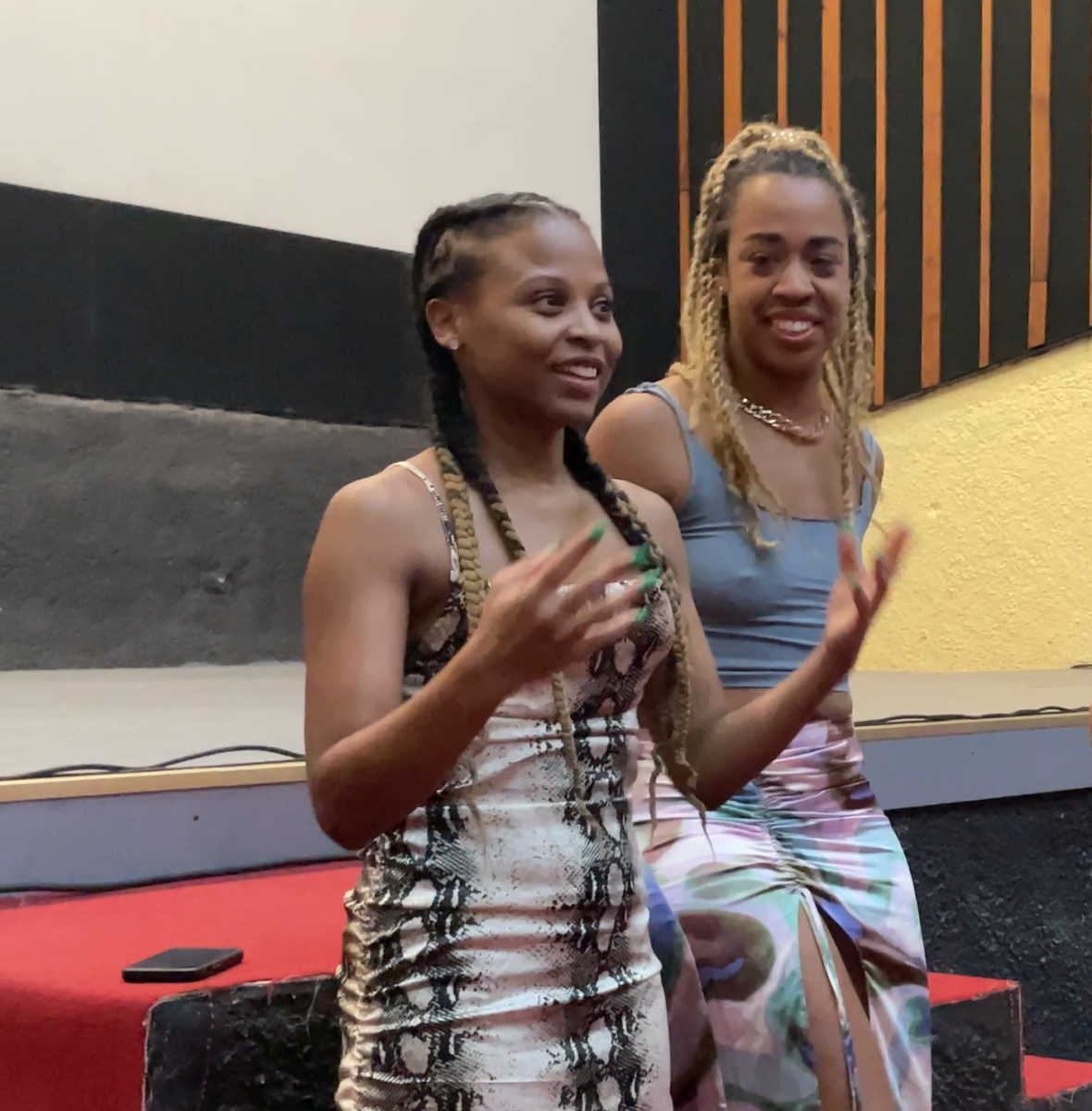
Unapologetic star, Ambrell, and Director, Ashley O'Shay. "Being here has been world changing for me."
And, when we showed We Still Here to a group of high school students, they were excited to see a story about young people taking things into their own hands to rebuild after Hurricane Maria. Their teacher pointed out how Cuba has often sent solidarity brigades to help folks in disaster situations.

Bakosó star, DJ Higue, and Filmmakers Eli and Kahlil Jacobs-Fantauzzi, with students after screenings at Casa de Caribe.
The Santiago Festival was not without its challenges. Transportation shortages caused the showing of one of our films to be canceled because projection equipment hadn’t arrived from Havana. And, 20 minutes into the Meerkat Collective’s 90-minute program, the lights went out in the Rialto Theatre due a power outage. But as is wont to happen in Cuba, se resolvieron (made a way out of no way), with cel phone lights illuminating a vibrant discussion in the darkened theater between the filmmakers and a group of journalism students. The budding journalists were inspired by the “evocative storytelling and real-life situations” expressed in Meerkat’s impactful shorts and newsreels.
Meerkat Collective with Cuban journalism students.
Q. & A. by candlelight!
So much more can be recounted about our 6-day experience at the Festival Internacional de Documentales Santiago Álvarez en Memoriam. But, by far, the main takeaway is the refreshing feeling of joy at sharing films and music in an atmosphere of curiosity and friendship, without the pressures of marketing and competition.

Co-curator Catherine Murphy with compañera Norma Guillard.